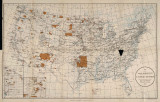| OCR Text |
Show REPORT OF THE COMMIBQONEB, OF INDIAN AFFAIFS. 49 The progress made by these Indians during the year has amply shown that the consolidation of the two agencies was wise. The bi-creased administrative e5ciency resulting from it should make possi-ble even greater development in the coming year. The administrative changes made on these reservations last spring, while pronioting agriculture among the Indians and leading to greater general eaciency, have at the same time resulted in a net re-duction in the cost of administration. CROW RESERVATION - MARKED SUCCESS OF NEW METHODS OF LEASING TRIBAL LANDS. The new method of leasing tribal lands whereby leases are granted under the sealed-bid plan and the property of the Indians more adequately protected met with its most conspicuous success on the Crow Reservation, in Montana. The grazing lands of this reservation are much sought by stock owners, as they are among the best grazing lands in the West. The bidding for grazing privileges on the lands was therefore spirited, and the leases brought thousands of dollam more than ever before. During the years 1908-9 five pastures on the Crow Reservation were let for $33,001.27, while the same pastures, under the new sys-tem, brought this year $140,250, or more than four times as much as the pastures brought the year before. F I m CIVILIZED TRIBES. The question of opening the rolls of the Five Civilized Tribes came up before Congress last year, but no legislation was enacted and the citizenship rolls of the Five Civilized Tribes still remain closed as of March 4,1907. Hearings were held before both Senate and House (;onunittees on Indian Affairs looking td the reopening of the citi-zenship rolls. The reason for this proposal was that there might be added to the rolls the names of 52 persons whose cases were passed upon favorably by the Commissioner to the Five Civilized Tribes, but the records thereof did not reach the department until after March 4, 1907, when the rolls were closed, and also that there might be a review of about 2,100 cases decided between February 19 and Jlarch 4, 1907, following the opinion of the Attorney-General of February 19, 1907 (26 Ops. Attorney-General, 127), wherein he held different views from those entertained by the Department of the Interior and upon which decisions had been rendered in many eases. It was also planned that the opening of the rolls should include an investigation of the proposed transfer of the names of cer-tain Choctaws and Chickasaws from the freedmen roll to the roll of citizens by blood because there was an alleged preponderance of Indian blood. |




















































































































































































